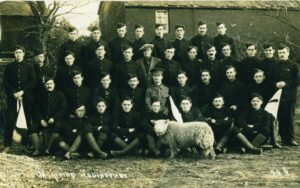The son of a Royal Naval Captain, Lowther was educated at Rugby School and after leaving school he entered the Diplomatic Service. In South Africa during the Second Boer War he served in the Imperial Yeomanry until 1900 and was recommended for the Victoria Cross for gallantry at the 1900 Battle of Faber’s Put. After leaving the army he became MP for Eskdale in Lancashire until 1906. He was fond of the arts and a man of refined taste. In 1911 Lowther moved to Sussex where he bought and began to restore Herstmonceux Castle.
In 1914 he raised three battalions for the Royal Sussex Regiment – the 1st, 2nd, and 3rd Southdowns. These battalions became known as “Lowther’s Lambs”, a nick-name referring to the well-known Sussex breed of Sheep, the “Southdown”. Their mascot was Peter, a lamb from Applesham Farm at Lancing. Peter died in 1928 and is buried at Herstmonceux Castle.

Lowther wanted all the men who served in these battalions to be truly Sussex men. It didn’t matter where they were living at the time, as long as they were born in Sussex. He hoped to raise a 4th Battalion of Sussex men, which would have created the only “County Brigade”, something of pride for him and the County, but he never managed to accomplish this.
He provisioned the enterprise from his own purse. Men were encouraged to return to their communities and spread the word. John Pannett, a Bexhill resident after the war recalled that;
“Life at the camp was wonderful and we all thoroughly enjoyed ourselves. Colonel Lowther was a great man, too, and I can remember how he used to let us feed off the fat of the land. Sometimes we had as many as 12 eggs for breakfast until he got stopped and then we had to go on more normal rations”.
On 10th December 1914 at a meeting held at the skating rink in Bexhill, Lowther gave one of his inspiring speeches. The “Bexhill Chronicle” reported it as “a speech of a quality in tone and delivery such as we seldom hear”. The following is that speech:
“If you join the Southdowns you will join a very gallant regiment – one of which every man can be justly proud. You will know by the Roll of Honour how they have distinguished themselves. And if they do not return, their names will live for ever to the glory of the county – the county where I have made my home; the county I love very much.”
“I am determined to make it impossible for any man in my regiment to go into the workhouse or die in destitution.”
“It is four to one against them, and I call every one of you to join the Southdowns, for Sussex is to stand by her sons.”
Lowther’s rank was elevated from Colonel to Temporary Lieutenant Colonel in September 1914 to reflect his responsibilities, but his health and absence was such that the running of the battalions passed into the hands of others. Lowther was hopeful of being attached to the Canadian Army Staff but it is not known if this took place. He devoted himself to his seat in the House of Commons, from which he retired in 1922
Lowther went on to successfully form a county organisation whose duty was to find permanent employment for ex-South Downs or to provide monetary assistance until such work was found for them following the end of the War.
Lowther died on 16th June 1929, at the age 57, cirrhosis of the liver and chronic morphinism are mentioned on his death certificate. He was unmarried and was survived by his two sisters.

